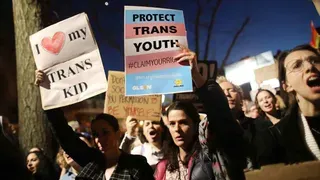May 27, 2021
If Only There Were A Vaccine To Protect Your Post-COVID-19 Household Finances
Mark Henricks READ TIME: 6 MIN.
With effective immunizations and a potential return to something resembling more or less normal life on the horizon, the question arises: Where's the vaccine for your post-COVID-19 household finances?
Unfortunately, there has been no Operation Warp Speed to provide lasting immunity to the sort of personal financial damage wrought by the pandemic. Stimulus payments are certainly welcome, but that's more like giving oxygen to a struggling patient than actually fixing anything.
Still, who knows? If 2020 taught people anything, it's the constant presence of uncertainty. A year ago, suffice to say, few if any people thought the U.S. would be where it is now. Even acknowledging the difficulty of looking ahead, however, some broad outlines that indicate the shape of post-COVID-19 household finances are appearing.
COVID-19 Versus Past Recessions
First, understand that this will likely not be like other serious economic downturns of the last century. In fact, the recession that accompanied the landing of the pandemic on U.S. shores hit harder in some ways than the early days of the Great Depression. In 2020, as much or more than in 1929, jobs, markets and general economic activity shriveled, and it became clear that we were up against something more serious than almost any living human had experienced.
However, as the St. Louis Fed noted in an August 2020 report, this is not your grandfather's Great Depression. The big difference: The Depression had staying power. This one will likely not last nearly as long. Of course, a slam like 2020 will produce echoes that reverberate for a few years, if not longer. But it's not going to be a lost decade by any means.
The post-COVID-19 economy is probably more like a post-hurricane economy. Natural disasters tend to produce economic slumps that are sharper and shorter than those generated by economic cycles, such as the Great Recession that began in 2008.
COVID-19 is a natural and human disaster far more than it is an economic one. If much of 2021 is a lot like most of 2020, then 2022 and beyond are probably going to more closely resemble 2019.
Post-COVID-19 Household Finance
With all that in mind, what's the ordinary consumer supposed to do? Doing the best you can, in the circumstances in which you find yourself, is a good approach. And that begins with assessing your current status.
Look at Your Employment
It's possible, for instance, that you're unemployed or coming off an extended spell of joblessness. December 2020 unemployment reported by the Bureau of Labor Statistics was a disturbing 6.7%, but much depended on where you are and what you do for a living. Figures for individual states ranged from lows right around 3% in Nebraska, South Dakota, Iowa and Vermont, to 9% or more in California, Hawaii and Nevada.
Different occupations have also been affected differently. An August 2020 report from the St. Louis Fed on the early months of the pandemic showed leisure and hospitality payrolls collapsing by 48.3%, while the finance sector was off just 3%. If you're a restaurant manager as opposed to an investment manager, you've fallen further and have more to get back in 2021.
Evaluate Your Savings
In addition to your job stability, recent history and prospects, you'll want to evaluate your savings. What is your status on short-term emergency funds? Numerous surveys have found Americans drew down rainy day funds in 2020. Some people took early withdrawals from long-term retirement funds to replace lost income and help pay bills.
In order to get back to where you were and make progress toward where you want to go, it will take budgeting. A TransUnion survey released in December 2020 found that cutting back on subscriptions and memberships, and canceling or reducing digital services, were popular ways to save money. Want 2021 to be better? Be slow to restart those expenses in the months ahead.
Rebuild Your Emergency Fund
When it comes to rebuilding your emergency fund, some financial experts say the lesson of COVID-19 is that the traditional three to six months' worth of expenses is inadequate. What you really want may be closer to 12 months, especially if you're the sole breadwinner. However, that's simply not realistic for most people.
If you direct 10% of your income to an emergency fund, it will take 10 years to get a year's income in a rainy-day account. There's no perfect safety net, and the likelihood of another pandemic is not necessarily higher in the future. So don't overreact. Stick with whatever emergency savings you can manage.
Get Retirement Savings Back on Track
On retirement savings, the experience of the COVID-19 era may suggest preparing for early retirement. After all, some positions and even careers have been decimated, if not completely eliminated.
On the other hand, another even bigger loss of COVID-19 is that a lot of lives ended prematurely. The uncertainty inherent in retirement planning is one of its biggest challenges: It's impossible to know how long a retirement you'll be funding, or what your investment returns are likely to be in the future. So plan to get your retirement savings back on track, to help ensure you're prepared for whatever occurs.
Consider Refinancing Loans
Refinancing is another matter. Continued historic interest rate lows provide an unparalleled opportunity to borrow money. This doesn't mean you should borrow to buy things you don't need. It does suggest you look into refinancing loans on things you already own – homes, certainly, but also cars, recreational vehicles and boats. In this sense, 2021 is an opportunity.
Reinforce Good Financial Habits
Another potential opportunity is the one to continue with some beneficial habits you picked up during 2020. For instance, you may be better at following a budget because you had to be. Ditto prioritizing expenses and cutting out nonessentials like dining out and gym memberships. You may have reached the point where you scrutinize many or most personal expenses to ask yourself if they're really necessary or whether those dollars could best be directed to savings or reducing debt.
If so, hang on to those. Because perhaps the most salient prediction about household finance post-COVID-19 is that most of 2021 is not going to be post-COVID-19 at all. Vaccines aside, Americans' wallets are still going to be in the thick of it.
It's Not Over Yet
First, understand that there are still more financial shocks to play out. Eviction and foreclosure moratoriums are set to expire in the months ahead. Many will be extended, but that can't last forever. At some point during 2021, more people than usual may lose their homes. You could be one of them. That may lead to more downsizing, moving in with relatives and relocation to less costly parts of the country.
Also, understand that, whatever your experience is, it's likely to be very different from what other people are experiencing. "We're all in this together" is arguably the dominant meme of this pandemic. But it may wind up categorized along with "Otherwise the terrorists win," which came to be seen more as a tool for the cynical to get others to do what they wanted than a real call for togetherness in the face of adversity.
Because while we're all Homo sapiens and, therefore, more or less at risk of contracting COVID-19, this is clearly a bifurcated recovery. Just as some people haven't been hurt by the pandemic economy, other people have been seriously hurt and have more hurt to come. We may be all in this together, but some of us seem to be more in it than others.
Confirming that, TransUnion's survey found lower- and middle-income consumers were less optimistic about the future than those with higher incomes. One possible reason: Knowledge workers, who earn their living by shuffling information more than serving customers face to face, tend to be paid more and to have had less job disruption due to social distancing. Whatever the cause, people who earn less also plan to cut back more in 2021, including reductions on gifts, vacations and home improvements.
In short, New Year's Day 2021 was significant on the human calendar, but the date meant nothing to the coronavirus. The post-COVID-19 household economy is coming, almost certainly, but it's not here yet.
A Rosier 2021
At this point, it's worth referring to a Fidelity survey that found a higher than normal nearly two thirds of Americans' reporting experiencing major life events during 2020. These events included the loss of a loved one and some sort of job upset.
It's not all bad, however. Nearly 90% of those Fidelity surveyed said something unexpectedly positive came from their pandemic experiences. Among the benefits are a greater appreciation for the power of perseverance and the wisdom to accept support from others.
The pandemic's global personal and financial costs have no doubt been more profound than those of nearly any episode anyone living can recall. And there are no refunds from the store of COVID-19. But perhaps we've bought something of real value with our pandemic sacrifice. As we go into the post-COVID-19 era, many of us are sadder and poorer. We may also be a little bit wiser about how we manage our money and ourselves.
Even if 2021 doesn't turn out to be exactly back to normal when it comes to household finance, it's worth bearing in mind that we've seen worse. That may not be prosperity, but it's not nothing either.







